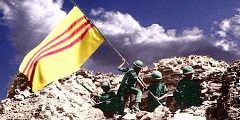VC c̣n mượn nợ thiên hạ để sống c̣n để làm ăn, th́ chuyện Mẽo bán vũ khí cho VC là chuyện cười bể bụng của mấy tay phù thuỷ chính trị ở Hoa Thịnh Đốn và Ba Đ́nh.
Các chuyên gia kinh tế quốc tế t́nh trạng kinh tế hẻo của VC: nợ trả lăi nước ngoài lớn, kinh tế suy thoái, lạm phát tiếp tục tăng, dân làm ăn kinh doanh buôn bán ế ẩm, thị trường bất động sản bị ngậm vốn nên nhiều ngân hàng ở VN tiếp tục bị phá sản. Thế cho nên kinh tế VC bết bát như vậy th́ VC có tiền mua vũ khí Mẽo ? Chánh khách Mẽo trong vụ này "khôn liền" quá.
China buys 70 Airbus A320 planes worth $6.6 bn
Airbus said on Friday that China Aviation Supplies Holding Company (CAS) has signed an agreement to buy 70 A320 family aircraft, an order worth $6.6 billion (5.2 billion euros) at list prices.
The order reflects the strong demand from Chinese carriers for single-aisle aircraft for domestic, low cost, regional and international operations, the European aircraft manufacturer said.
"We are grateful to China for its strong vote of confidence in our leading A320 family aircraft, and are happy to see them assembled at our Chinese facilities," Airbus chief executive Fabrice Bregier said in a statement.
Airbus has already assembled and delivered 190 A320 aircraft from a facility in China's Tianjin Free Trade Zone.
It said it had also signed a letter of intent with its Chinese partners to build a similar facility for A330 family aircraft, wide-body planes that can carry over 400 passengers.
"In its 30 years history the Airbus partnership with China keeps on growing and expanding," Bregier said.
The letter of intent was signed Friday in Berlin with the heads of the Tianjin Free Trade Zone and the Aviation Industry Corporation of China in a ceremony witnessed by German Chancellor Angela Merkel and visiting Chinese Premier Li Keqiang.
"The intended establishment of an A330 Completion and Delivery Centre will add a new exciting chapter to our longstanding track record of mutual achievements," added Brieger.



 Reply With Quote
Reply With Quote
Bookmarks